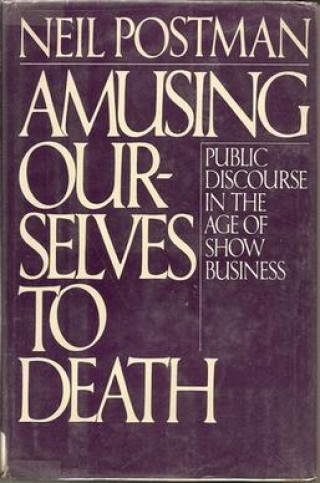Postman was writing as America reelected a former Hollywood actor. Ronald Reagan leaned into his star power, filling his speeches with film references and syrupy slogans about “morning in America.” He also blurred fact and fiction, confusing movie plots with real events or parroting the latest conspiracy theory from the far-right John Birch Society. A consummate performer, Reagan delivered these untruths with such sunny authenticity that it was hard to call him a liar—a dangerous trend, as Postman pointed out: “Orwell feared a world controlled by fear and censorship,” he wrote. “The more immediate danger is that we surrender our attention willingly to trivial distractions.”
Amusing Ourselves to Death resonated during Trump’s first term, when spectacle generally seemed to override substance. Substantive efforts at policy reform—repealing Obamacare or the much derided “Infrastructure Week”—were usually sidetracked by scandals or social media spats. While adept at manipulating the news cycle, the Trump Administration seemed to have no strategy for harnessing these cycles of outrage into meaningful policy change.
But today, Postman’s framework feels less adequate as the Trump Administration now focuses less on ratings and more on wielding state power to suppress dissent and reshape institutions. Trump remains the entertainer-in-chief, but behind him is a disciplined cadre of right-wing ideologues, humorless figures who let him dominate the spotlight while they quietly rewire the American state. The endgame, such as it is, looks less like Huxley’s pleasure-drenched dystopia and more like Orwell’s authoritarian one.
Consider the role of the state.
Postman didn’t envision democracy being crushed from above. He feared a slow decay from within, a culture so distracted and disengaged that repression would be unnecessary. Why ban books, Postman asked, if no one bothers to read them? Americans, he wrote, were more likely to “dance and dream themselves into oblivion than march into it, single file and manacled.”
Today, banning books and policing curriculums are top priorities for Republicans. And single file and manacled is exactly how 238 Venezuelans were frog-marched into El Salvador’s prisons last March, expelled from the U.S. without trial. Over the past few months, masked ICE agents have arrested individuals in unmarked vans, the victims of blunt assertions of state power designed both to “trigger the libs” and divert attention from more inconvenient truths—like how deportations under Trump have remained comparatively modest; or how his administration’s signature legislative achievement is tax cuts for the wealthy. These are not distractions in Postman’s sense of passive entertainment. Instead, they are carefully crafted spectacles that rely on the aggressive deployment of state power. The distraction does not eliminate the need for state repression. It depends on it.
